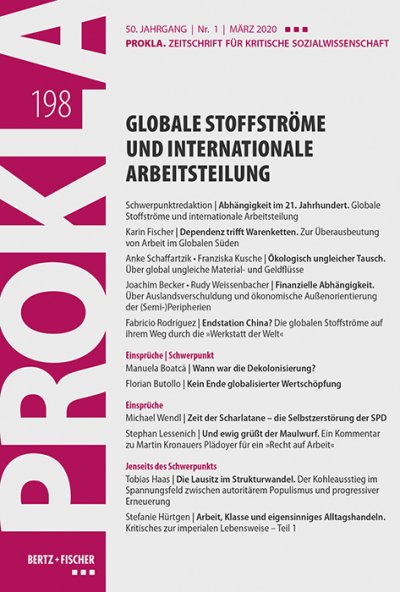Ökologisch ungleicher Tausch: Wachstum auf Kosten von Mensch und Natur
Nur ungleiche Material- und Geldflüsse in globalem Maßstab ermöglichen eine wachstumsorientierte Entwicklung
DOI:
https://doi.org/10.32387/prokla.v50i198.1854Schlagworte:
Ungleichheit, Außenhandel, Ressourcen, sozialer Metabolismus, gesellschaftlicher Stoffwechsel, MaterialflüsseAbstract
Die wachstumsgeleitete ‚Entwicklung‘, die derzeit trotz verheerender ökologischer und sozialer Konsequenzen verfolgt wird, ist abhängig von ökologischer Ungleichheit. Als ökologisch ungleicher Tausch erlaubt der Außenhandel die Ausdehnung des ökologischen Handlungsspielraums einiger weniger, während er für viele andere deren Einengung bedeutet. Das erst ermöglicht weiteres globales Wachstum und verschärft dabei gleichzeitig bestehende Ungleichheiten und asymmetrische Machtverhältnisse.
Downloads
Literaturhinweise
Amin, Samir (1977): Unequal Development: An Essay on the Social Formations of Peripheral Capitalism. New York.
Bartley Johns, Marcus / Brenton, Paul / Cali, Massimiliano u. a. (2015): The role of trade in ending poverty. Geneva.
Bhaskar, Vinit / Glyn, Andrew (Hg.) (2014): The North the South and the Environment. Ecological Constraints and the Global Economy. Oxon.
Biermann, Frank / Boas, Ingrid (2010): Preparing for a Warmer World: Towards a Global Governance System to Protect Climate Refugees. In: Global Environmental Politics 10(1): 60–88. DOI: https://doi.org/10.1162/glep.2010.10.1.60.
Brand, Ulrich / Wissen, Markus (2017): Imperiale Lebensweise: zur Ausbeutung von Mensch und Natur im globalen Kapitalismus. München.
Bunker, Stephen G. (1984): Modes of Extraction, Unequal Exchange, and the Progressive Underdevelopment of an Extreme Periphery: The Brazilian Amazon, 1600-1980. In: American Journal of Sociology 89(5): 1017–1064. DOI: https://doi.org/10.1086/227983.
Duro, Juan Antonio / Schaffartzik, Anke/Krausmann, Fridolin (2018): Metabolic Inequality and Its Impact on Efficient Contraction and Convergence of International Material Resource Use. In: Ecological Economics 145: 430–440. DOI: https://doi.org/10.1016/j.ecolecon.2017.11.029.
Emmanuel, Arghiri (1972): Unequal Exchange: A Study of the Imperialism of Trade. New York.
Fischer-Kowalski, Marina / Erb, Karl Heinz (2016): Core Concepts and Heuristics. In: Haberl, Helmut / Fischer-Kowalski, Marina / Krausmann, Fridolin u. a. (Hg.): Social Ecology. Society-Nature Relations across Time and Space. Cham: 29–61.
González de Molina, Manuel / Toledo, Víctor M. (2014): The social metabolism: a socio-ecological theory of historical change. London-New York.
Hornborg, Alf (1998): Towards an ecological theory of unequal exchange: articulating world system theory and ecological economics. In: Ecological Economics 25(1): 127–136. DOI: https://doi.org/10.1016/S0921-8009(97)00100-6.
– (2003): The Unequal Exchange of Time and Space: Toward a Non-Normative Ecological Theory of Exploitation. In: Journal of Ecological Anthropology 7(1): 4–10.
– (2011): Global Ecology and Unequal Exchange : Fetishism in a Zero-Sum World. Abingdon. DOI: https://doi.org/10.4324/9780203806890.
Infante-Amate, Juan / Krausmann, Fridolin (2019): Trade, Ecologically Unequal Exchange and Colonial Legacy: The Case of France and its Former Colonies (1962–2015). In: Ecological Economics 156: 98–109. DOI: https://doi.org/10.1016/j.ecolecon.2018.09.013.
Jakob, Michael / Marschinski, Robert (2012): Interpreting trade-related CO2 emission transfers. In: Nature Climate Change 3(1): 19–23.
Jorgenson, Andrew K. / Rice, James (2005): Structural Dynamics of International Trade and Material Consumption: A Cross-National Study of the Ecological Footprints of Less-Developed Countries. In: Journal of World-Systems Research 11(1): 57–77. DOI: https://doi.org/10.5195/jwsr.2005.393.
Krausmann, Fridolin / Wiedenhofer, Dominik / Lauk, Christian u. a. (2017): Global socioeconomic material stocks rise 23-fold over the 20th century and require half of annual resource use. In: Proceedings of the National Academy of Sciences 114(8): 1880–1885. DOI: https://doi.org/10.1073/pnas.1613773114.
Kusche, Franziska (2019): Die sozial-ökologische Krise ver_handeln! Eine gesellschaftstheoretische Betrachtung des Konzepts des Ökologisch Ungleichen Tausches (Master’s Thesis). Wien.
Lemus, J. Jesús (2018): México a cielo abierto: De cómo el boom minero resquebrajó al país. Mexiko Stadt-Barcelona.
Martinez-Alier, Joan (2003): The Environmentalism of the Poor: A Study of Ecological Conflicts and Valuation. Cheltenham.
Mies, Maria / Shiva, Vandana (2016): Ökofeminismus: Die Befreiung der Frauen, der Natur und unterdrückter Völker. Neu-Ulm.
Odum, Howard T. (1988): Self-Organization, Transformity, and Information. In: Science. 242(4882): 1132–1139. DOI: https://10.1126/science.242.4882.1132.
Oulu, Martin (2016): Core tenets of the theory of ecologically unequal exchange. In: Journal of Political Ecology 23(1): 446–466. DOI: https://doi.org/10.2458/v23i1.20251.
Prebisch, Raúl (1949): The Economic Development of Latin America and its principal problems. New York.
Rodríguez-Labajos, Beatriz / Yánez, Ivonne(Bond, Patrick u. a. (2019): Not So Natural an Alliance? Degrowth and Environmental Justice Movements in the Global South. In: Ecological Economics 157: 175–184. DOI: https://doi.org/10.1016/j.ecolecon.2018.11.007.
Samuelson, Paul A. / Nordhaus, William D. (2010): Economics. 19. Aufl. New York.
Schaffartzik, Anke / Fischer-Kowalski, Marina (2018): Latecomers to the Fossil Energy Transition, Frontrunners for Change? The Relevance of the Energy ›Underdogs‹ for Sustainability Transformations. In: Sustainability 10(8): 2650. DOI: https://doi.org/10.3390/su10082650.
Schaffartzik, Anke / Mayer, Andreas / Eisenmenger, Nina u. a. (2016): Global patterns of metal extractivism, 1950–2010: Providing the bones for the industrial society’s skeleton. In: Ecological Economics 122: 101–110. DOI: https://doi.org/10.1016/j.ecolecon.2015.12.007.
Schaffartzik, Anke / Pichler, Melanie (2017): Extractive Economies in Material and Political Terms: Broadening the Analytical Scope. In: Sustainability 9(7): 1047. DOI: https://doi.org/10.3390/su9071047.
Scheidel, Arnim / Schaffartzik, Anke (2019): A socio-metabolic perspective on environmental justice and degrowth movements. In: Ecological Economics 161: 330–333. DOI: https://10.1016/j.ecolecon.2019.02.023.
Singer, Hans W. (1950): The Distribution of Gains between Investing and Borrowing Countries. In: The American Economic Review 40(2): 473–485.
Svampa, Maristella (2015): The ›commodities consensus‹ and valuation languages in Latin America. In: Alternautas 2(1): 45–59.
Temper, Leah / Del Bene, Daniela / Martinez-Alier, Joan (2015): Mapping the frontiers and front lines of global environmental justice: the EJAtlas. In: Journal of Political Ecology 22(1): 255–278.
Toledo, Víctor Manuel (1981): Intercambio ecológico e intercambio económico en el proceso productivo primario. In: Leff, Enrique (Hg.): Biosociología y Articulación de las Ciencias. Mexico City: 115–147.
UNEP (2016): Global material flows and resource productivity. Autoren: Heinz Schandl, Marina Fischer-Kowalski, Jim West u.a. United Nations Environment Programme, International Resource Panel. Nairobi.
– (2019): Natural Resources: Resource Efficiency Indicators. International Resource Panel of the United Nations Environmental Programme (UNEP). Nairobi.
Wiedmann, Thomas O. / Schandl, Heinz / Lenzen, Manfred u. a. (2015): The material footprint of nations. In: Proceedings of the National Academy of Sciences 112(20): 6271–6276. DOI: https://doi.org/10.1073/pnas.1220362110.
World Bank (2019): World Development Indicators. Washington/DC.






